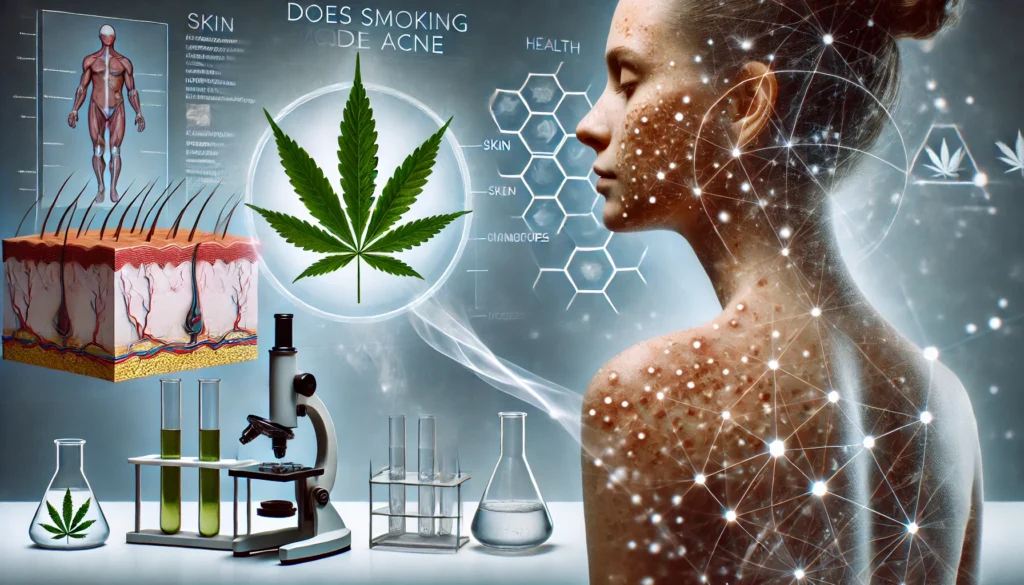Cannabis has become increasingly popular worldwide, but many users wonder about its potential impact on skin health. Specifically, does smoking weed cause acne? Let’s dive into the connection between cannabis use and acne, exploring the science, lifestyle factors, and tips for keeping your skin healthy.
What is Acne?
Acne is a common skin condition that occurs when hair follicles become clogged with oil, dead skin cells, and bacteria. It often appears as pimples, blackheads, or cysts on the face, chest, or back. The main factors influencing acne include:
- Hormones: Fluctuations can lead to increased oil (sebum) production.
- Inflammation: Skin irritation can worsen breakouts.
- Diet: High-sugar and high-fat foods can contribute to acne.
- Skincare Habits: Neglecting regular cleansing or using pore-clogging products can exacerbate acne.
Can Smoking Weed Cause Acne?
There isn’t a definitive answer, but several factors suggest that smoking weed may contribute to acne under certain conditions. Here’s a closer look:
Hormonal Impact
THC, the psychoactive compound in cannabis, can temporarily increase cortisol levels (the stress hormone). Elevated cortisol may stimulate the sebaceous glands, leading to excess oil production and clogged pores. This hormonal shift could worsen acne for some users.
Inflammation from Smoking
When cannabis is smoked, toxins and pollutants are released. These can settle on the skin, causing inflammation and irritation, which might aggravate existing acne or trigger new breakouts.
Increased Oil Production
Some studies suggest that THC can directly influence sebaceous glands to produce more oil. Excess oil can mix with dead skin cells, creating an ideal environment for acne-causing bacteria.
Lifestyle Factors
Cannabis use can indirectly affect acne through lifestyle changes. For example:
- Diet: The “munchies” often lead to consuming sugary or greasy foods, which can worsen acne.
- Skincare Neglect: After using cannabis, some individuals might skip their skincare routine, allowing dirt and oil to accumulate.
Does Smoking Itself Affect Skin Health?
Yes, smoking—whether cannabis or tobacco—can negatively affect your skin. Smoke introduces toxins that can clog pores and reduce oxygenation, impairing the skin’s ability to heal. Over time, this can lead to dull, damaged skin and more severe acne.
If you’re concerned about the effects of smoke on your skin, consider alternative consumption methods like edibles, tinctures, or vaping (though vaping also has potential risks).
Can Cannabis Help Acne?
Interestingly, cannabis isn’t all bad for your skin. Cannabidiol (CBD), a non-psychoactive compound found in cannabis, has shown promise in treating acne.
- Anti-inflammatory Properties: CBD can reduce skin inflammation, helping to calm redness and irritation associated with acne.
- Sebum Regulation: Research suggests that CBD can help regulate oil production, potentially preventing clogged pores.
Topical CBD products, such as creams or serums, might be a good option for acne-prone individuals.
Tips for Preventing Acne While Using Weed
If you enjoy cannabis but want to maintain clear skin, try these tips:
Stick to a Skincare Routine:
Cleanse your face twice daily to remove dirt and excess oil.
Use non-comedogenic products to avoid clogged pores.
Stay Hydrated:
Drink plenty of water to keep your skin hydrated and flush out toxins.
Limit Sugary Snacks:
Opt for healthier munchie options, like fruits, nuts, or whole-grain snacks.
Choose Alternative Consumption Methods:
Avoid smoking and try edibles or tinctures to minimize exposure to skin-damaging smoke.
Don’t Touch Your Face:
Avoid touching your face while high to prevent transferring dirt and bacteria.
What Does Science Say?
While studies on cannabis and acne are limited, the existing research highlights key points:
- Smoking can introduce toxins that irritate the skin.
- THC might stimulate oil production, while CBD has anti-acne potential.
- Lifestyle factors associated with cannabis use play a significant role in skin health.
More research is needed to fully understand the relationship between cannabis and acne.
When to See a Dermatologist
If your acne is persistent or severe, consult a dermatologist. They can recommend treatments such as:
- Topical retinoids or benzoyl peroxide.
- Oral medications like antibiotics or isotretinoin.
- Customized skincare regimens.
Conclusion
So, does smoking weed cause acne? The answer isn’t black and white. While cannabis use may contribute to acne through hormonal changes, inflammation, and lifestyle factors, it’s not a direct cause for everyone. To keep your skin healthy, maintain a consistent skincare routine, make mindful dietary choices, and consider alternative cannabis consumption methods.
Frequently Asked Questions (FAQS)
Does smoking weed directly cause acne?
While smoking weed doesn\u2019t directly cause acne, factors like increased oil production, inflammation, and lifestyle habits associated with cannabis use may contribute to breakouts.
Can edibles prevent acne compared to smoking weed?
Yes, consuming edibles avoids exposing your skin to smoke-related toxins, potentially reducing inflammation and clogged pores.
Does CBD help clear acne?
CBD has anti-inflammatory and oil-regulating properties that may help reduce acne, especially when applied topically.
Are the munchies from weed linked to acne?
High-sugar and greasy foods often craved during the munchies can worsen acne by increasing inflammation and oil production.
How can I prevent acne while using weed?
Stick to a solid skincare routine, stay hydrated, eat balanced meals, and opt for non-smoking cannabis methods to protect your skin.
Recommended Article:
Nursing Portfolio Examples PDF: A Comprehensive Guide
Professional Nursing Portfolio: Your Comprehensive Guide
Does Shroom Show Up on Drug Test? Everything You Need to Know


